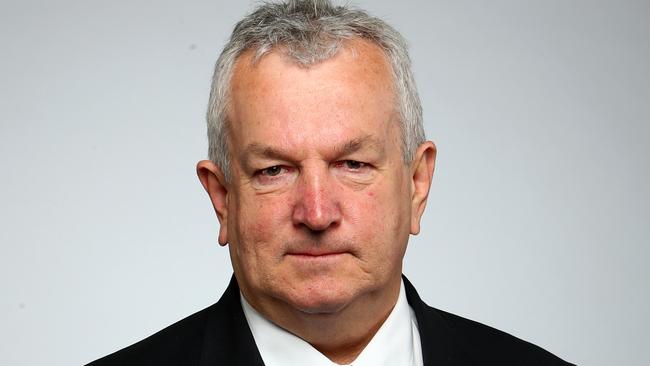Woolworths boss Brad Banducci’s take on ESG
Ethical action is not a zero-sum game.

Brad Banducci doesn’t like the acronym ESG.
The Woolworths boss says its “clunky” and now that “sustainability has gone mainstream”, he prefer to position his company around its stated purpose of creating “better experiences together for a better tomorrow”.
That purpose statement was developed with staff when Banducci became chief executive five years ago.
His approach is in line with a huge shift in attidues across the world: old school thinking that there is an either/or decision to be made by companies that necessarily pits shareholders against stakeholders is over. The new mantra is that if a business is doing the right thing by society, it is doing right by its shareholders.
The most successful companies, according to London Business School’s Alex Edmans, don’t target profit directly but are driven by purpose — the desire to serve a societal need and contribute to human betterment.
In his recent book, Grow the Pie, Edmans details how a purpose statement that is more than a generalised mission and is embedded into how the company operates actually grows the company. He notes: “There is a role for regulation, but there is a limit to what you can achieve with it because it only leads to compliance, not commitment.”
A recent PwC survey found corporate Australia was failing to keep pace on ESG, noting 84 of the top 200 companies “had insufficient reporting to warrant inclusion in the analysis”.
It said “of those companies that do have an ESG strategy, approximately half do not adequately link it to their core business strategy”.
Even so, the last half-year profit season showed a sea change in attitude with a strong sense that better long term performance comes from a better understanding of the company’s role in the community.
Wesfarmers built its reputation on a simple commitment to providing satisfactory returns to shareholders, and chairman Michael Chaney has long based this on a measurement of return on capital.
But the company now says the best way to increase returns is to anticipate customer needs, look after staff, engage ethically with suppliers, support the communities in which it operates, act with integrity and take care of the environment.
This year, it broke new ground by adding levels of carbon emission reduction and staff injury frequency to its investor presentations in the same slides alongside divisional revenues, capital returns and earnings.
Wesfarmers boss Rob Scott argues that “shareholders want to see evidence that words are being put into action”.
Banducci is impressed and says he will do the same as Wesfarmers in Woolworths’ reporting on the next half.
For the Woolworth boss, the events of 2020 — COVID-19 and the bushfires — changed consumer thoughts about what they want to buy. It might not have been so evident in the early days of the lockdown when supermarket shoppers fought over the last rolls of toilet paper but there is plenty of evidence that consumers are prepared to pay more for sustainable options.
Banducci maintains that “COVID has seen a change in people’s reactions, so it’s less about them”. This “holistic feeling of wellbeing” in the retailer helps drive staff morale and behaviour, he says. “Food is about health.”
The sense of community was also present when Woolworths and Coles took on out-of-work staff from Qantas and Virgin to help cope with the boom in supermarket sales during the pandemic.
Debate on whether issues like emission reduction are proper concerns for corporates misses the point. It’s not a zero-sum game: emissions reduction and ethical behaviour are key to sustainable returns and as such are core competencies for any company that wants to post superior shareholder returns.
Some cynics say companies talk up ESG because investors have jumped on board and shareholder support depends on embracing these ideas.
Companies don’t always deliver on their promises but the need to also meet bottom line objectives is clear to leaders such as Rio Tinto’s Jakob Stausholm, BHP’s Mike Henry, Chaney and Banducci.
Chicago economist Milton Friedman was right when he argued that a company’s primary duty is to maximise shareholder returns. But the reality is the best way of doing this is to operate in a way that benefits the rest of society.
Banducci took over at Woolworths five years ago when the retailer was reeling from its disastrous joint venture with hardware company Masters and dealing with poor returns and a resurgent rival in Coles.
When he launched the process to set the company’s purpose, the new CEO noted: “It must be shared and committed to and once it is in place, you can do amazing things. We need to do these things to make a profit.”
Under the guidance of long-time executive Alex Holt, the company is rolling out initiatives as part of a commitment “to apply circular thinking to everything we do”.
About 18 per cent of stores are now fitted with solar panels as part of a national rollout. The stores all have LED lighting and blinds on fridges to maintain the right temperatures.
The chain’s key objectives are to be carbon net positive by 2050 and have 100 per cent of its home branded products in sustainable packaging. It is also committed to getting rid of single-serve plastics and introducing compostable bags in the fruit and vegetable department of stores.
There are many examples of how the lessons in sustainability are having an impact on business leaders. The bosses of Australia’s big three energy companies, AGL, Origin and Energy Australia — Brett Redman, Frank Calabria and Catherine Tanna respectively — all have solar panels on their roofs at home, for example.
It’s about better home management, caring for the environment, and the recognition that it’s cheaper in the long run. But the move also underscores the very big challenge all three companies face around managing their coal-fired power stations into the future.



